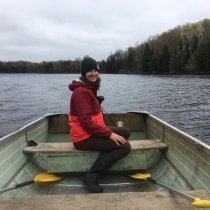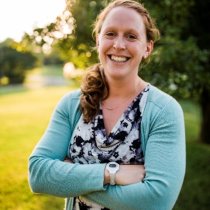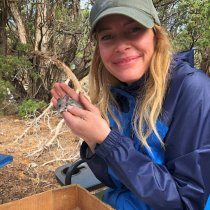Spotlight
Women in Ecology: Laura Leyba-Newton
March 9, 2018
Laura Leyba-Newton, Director of Engineering, has a pretty big job. She oversees the Engineering team, Calibration and Validation team, and the Audit Laboratory at the NEON project. Her staff design, test and calibrate technology for sensors deployed in the water, soil and on or near flux towers at NEON field sites. Some of the questions they've tackled about the design and construction of the observatory include:
- What strategies will enable NEON to collect standardized, quality data from remote locations across the U.S.?
- What type of engineering architecture will enable near real-time monitoring of the state of health of all field site locations?
- How can we build processes to reliably fix problems from afar when systems falter?
- How do we audit external analytical laboratories that process the biological samples/specimens collected by NEON’s Field Operations Group?
What’s the best part of your job?
The people I manage are brilliant and fun individuals. This makes my job fun and challenging at the same time.
Describe some of the projects you’ve gotten to work on in your career:
I have been very fortunate to have worked on two very cool National Science Foundation (NSF) projects. Before the NEON project, I was a design engineer for the Atacama Large Millimeter/submillimeter Array (ALMA) telescope that was built in the Atacama Desert in Chile. This was an unforgettable experience. And now, working at Battelle, I’m managing some extremely brilliant engineers and scientists. On a daily basis, I get to see and provide input on many awesome designs that cover a diversity of engineering and science disciplines -- everything from electrical, mechanical, and software engineering to quality testing and physics.
What inspires you to work for the NEON project?
Definitely the challenge of the project’s mission, but most importantly the people I get to work with. I learn something new and feel challenged every day while working on delivering a project that the human race and our earth will benefit from; what more can I ask for!
Did you always know you were interested in Science, technology, engineering and math (STEM)?
As a child I was always interested in how things worked; countless times, I took things apart to get a deeper understanding. My parents did not discourage the behavior; in fact, they encouraged it by letting me attempt to fix various broken electronics. My interest grew even more in high school when I got to take science classes that were very hands on. My initial major was biology but I quickly changed my path and followed my sister’s footsteps into a major in engineering.
What role have mentors played in your STEM success?
I have been very fortunate to have had extraordinary role models in my life; from my parents that encouraged me and taught me to work hard and still love the work, to my sisters that showed me that girls can succeed in a mostly male-dominated field of study. My role models extended to the start of my career and beyond where I have always had strong support to succeed and mentors to learn from, this included my husband, all my managers and coworkers along the way.
Which parts of Science, Technology, Engineering and Math (STEM) are relevant to what you do?
Science, Technology and Engineering
What relevant STEM schooling have you had?
B.S. Engineering/Electrical
Any words of wisdom for girls or young women about STEM careers/schooling?
We need you! School may at times feel hard, but stick to it because the price at the finish line is a career that is fulfilling, fun and challenging. Don’t be afraid to ask for advice at any time during your path to a STEM career, asking does not show weakness but it shows boldness. Hard work and persistence will get you far.
About the NEON #WomeninSTEM series
According to U.S. Census Bureau statistics, women in fields commonly referred to as STEM (science, technology, engineering, mathematics) made up only 25 percent of the STEM workforce in 2011. However, women now make up half the national workforce, and earn more college and graduate degrees than men. So, why are women not going into STEM careers? In this series of interviews of Battelle employees working on the National Ecological Observatory Network (NEON), we will feature some of the amazing female STEM professionals at Battelle and ask them to talk about how they found their way into the world of STEM and what words of advice they have to give the next generation of girls in STEM.
#WorkforNEON
STEM positions for the NEON project include engineers, scientists, educators, computer scientists, system engineers and more. To learn about current career opportunities, visit our Careers page.



